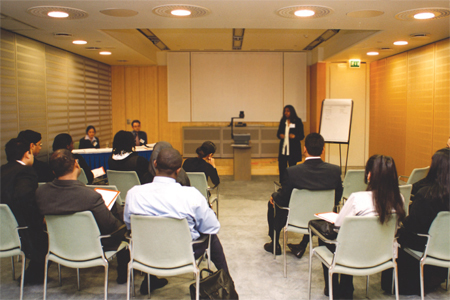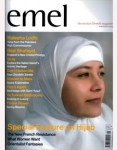
Cultural diversity training
Issue 4 Mar / Apr 2004
The incident is justifiably cringe-worthy: any outer practice of your faith (e.g. fasting in Ramadan) is met with questions “don’t you want to go to lunch?” “why aren’t you eating?” and the inevitable “Wot! For 30 days you don’t eat anything?”
Whatever your answer, it is met with a quizzical/confused/bemused face. Nevertheless, as Rabia Barkatulla discovers, it seems that soon it won’t be an occurrence experienced by many; Cultural Diversity trainers are now being utilised more than ever before to inform and enlighten the UK.
The current need for cultural diversity training is an indispensable positive initiative that governmental bodies, businesses and public services are all interested in developing. The fact is that ethnic minorities make up 7.1% of the British community, so cultural diversity is an issue that is vital for the UK to become more understanding of it’s multicultural society, and hopefully any xenophobic practices within service will be forced out.
Many areas of the UK have seen tremendous economic and social change; but these changes haven’t always been desirable to all. Consequently, rather than relationships between varying cultural communities improving and developing, in some cases they have actually deteriorated. In the summer of 2001 disturbances occurred in Bradford, Oldham and Burnley. This unrest appeared to have been born out of the seeming collapse of cultural cohesion and the fact that in these areas there was very little interaction between individuals of different cultural, religious and racial backgrounds.
Karima Zahi is Cultural Diversity Trainer at the Northern Ireland Council for Ethnic Minorities (NICEM). Born in France, she moved to the north of Ireland in 1987. With a background as a linguist, teacher, trainer and human rights activist, she has extensive experience in developing and delivering training and education programmes in various sectors in France, Northern Ireland, England and the Republic of Ireland.
I ask Karima to define cultural diversity, “Often there is confusion over the term cultural diversity training. It is in fact an anti-racist approach. We want people to celebrate and value difference. If we take the Muslim tradition as an example, it is important to value differences and appreciate the way in which Muslim lifestyles are reflected through the contribution Muslims have made to art, science, literature, cuisine, medicine and much more.”
Karima specialises in anti-discriminatory practice, equality and human rights issues and ‘Training of Trainers’ programmes. “We are approached by organisations who are interested in cultural diversity training as well as embarking upon partnerships and building alliances with policy makers, the education sector and community groups. Another aspect of our work is to ensure that minorities have access to training and services that help them to integrate into the community.”
Through their ‘Training of Trainers’ initiative, NICEM encourage minority groups to have their own trainers. Karima tells me she sees this as a form of, “quality control, so that cultural awareness can be upheld with a degree of accuracy.”
“In policing, teaching, business and social services, management are now setting aside a percentage of the organisation finances for staff training; particularly in cultural diversity” I am told by Batool Al-Toma of the Islamic Foundation.
Batool has been working as a cultural diversity trainer since the mid 90’s, and became involved after graduating from a degree in Islamic studies. “Knowledge of Islam and knowledge of the Muslim community are vitally important.”
Since 1993, the Islamic Foundation has been running in-house training as well as a residential 2-day course at their centre in Leicester. “The highlight of the residential course for the participants is a dinner we organise for them in which they meet local Muslims who are involved in youth work or chaplaincy; they are able to discuss practical things in an unstructured, down-to-earth dialogue.” I ask her if the people who attend the course (of which a large percentage are police recruits) bring with them stereotypical views about Muslims and Islam. “Sadly there is still a very bad misunderstanding of women in Islam, and this issue is something the women who come to the Foundation have views about; I believe that the Muslim community is 75% to blame for the misconceptions. But when these women talk to other [Muslim] women in the dinner, they realise that we have so much in common; the empathy and understanding shared is amazing; topics like childcare are often discussed.”
The in-house training is a direct talk, done with consideration of the audience; whether they are probation officers, liaison officers or teachers, a broad perspective must be provided. The residential course is, however, proving increasingly popular, as participants travel from all over the country. It is of course necessary that Islam is not portrayed as the utopia it may be in theory. As a cultural diversity trainer, the Muslim community is under the microscope, and however difficult it may be, it must be analysed; warts and all.
“We try not to gloss over the bad aspects.” Batool reminds me. “Some police sergeants share their experiences and case studies of the rising problem of domestic violence in Muslim homes. Usually the family hushes this up, but we assure our trainees that this is not an Islamic practice, and that police interference is necessary to eradicate it.”
“The Muslim community are very good at presenting a mish-mash of culture, religion and old wives tales and put it under the banner of Islam explaining to public authorities that they can’t do this, or they aren’t allowed to do that because of their faith. For example, trying to excuse truancy in schools. If the public services are well versed in Islamic knowledge, they can understand the situation better and hopefully be better equipped to handle it.”
I ask Batool how she feels cultural diversity training can benefit the UK as a whole. “We are not a monoculture; we never were and I think it is something admirable about the UK. If we are going to join the E.U. and become part of a global village this form of training is vitally important. France and Germany have chosen to contest and struggle with it, but these kinds of training add to the understanding, appreciation and respect that we need.”
27% of employees for London Transport are from ethnic minorities, as well as 23% of doctors in the U.K. 24% of restaurant employees are immigrants and members of ethnic minorities own over 67% of self-regulating shops.
Useful contacts: www.cre.gov.uk is the website for the commission for racial equality. This website has pages that inform the reader of how legislation affects employment practices, statistics and governmental information. www.hrpress-diversity.com offers videos, packs and books to aid cultural diversity training.
http://europa.eu.int is a European website where you can check out the relevant European legislation.
http://employment.surfwax.com/files/diversity-training.html is a useful link that discusses the need for cultural diversity training.
www.minorityrights.org deals with the rights of minorities whether they are religious, racial or otherwise.
Bookmark this |
|
Add to DIGG |
|
Add to del.icio.us |
|
Stumble this |
|
Share on Facebook |
|
Share this |
|
Send to a Friend |
|
Link to this |
|
Printer Friendly |
|
Print in plain text |
|


Comments
0 Comments